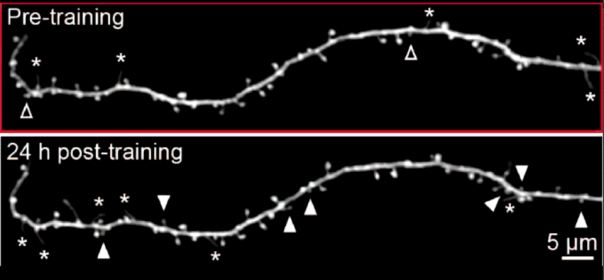In watching this first week’s lectures, it struck me that I don’t even know, really, what “learning” is. Acquisition of knowledge or skills- sure, sure. I get it. And “memory” is the faculty by which our mind stores and remembers that shiny new knowledge and those super-groovy skills. Gotcha.
But biologically speaking, what are learning and memory- and how do they relate?
From the little I’ve gleaned from this week, and with virtually no background in the subject area, it looks to me as though learning is all about making connections.
(Muy simplistic, I know. But I’m backed up by this excellent image from the journal, Science, showing the differences in an animal brain before learning a new task and after the task had been learned and the animal had slept. The little white arrows are newly-formed synapses on one dendritic branch of a neuron. More synapses = more connections, amiright? ::grumble call me simplistic grumble grumble::)

So that’s learning. Glad I got that sorted. But what steps are required to create all of those adorable new neural gateways?
In his article, “How Memory Works,” Dr. Richard C. Mohs speaks of memory more as a process than as a thing that can be “good” or “bad.” (There goes my excuse for forgetting peoples’ names.) This process consists of three steps: encoding, storage, and retrieval.
Encoding
Encoding is a “biological phenomenon, rooted in the senses, that begins with perception.” (Break for heated Cartesian debate… aaaaaaaand done.) I’d love to quote the entire page here- it’s full of delicious details regarding synapses connecting nerve cells, electrical pulses triggering the release of neurotransmitters, neurotransmitters diffusing and connecting neuron to neuron- but it’d take too long, and I’m lazy. (One of the many excellent reasons to take this class- more efficient learning equates to more free time in which to laze!)
One thing about encoding that Dr. Mohs makes special note of: it’s unknown, at this time, whether the stimuli that sometimes start the encoding process are screened out during the sensory input stage, or only after the hippocampus and frontal cortex have processed the stimuli’s significance. If anyone knows of any other research in this area, I’d love to know more about it! I wonder sometimes whether this may be one of the places where emotion can play a subliminal role- highlighting the importance of a certain kind of stimulus in such a way that reinforces its perceptual encoding. Hm.
Storage
Anyway, encoding is one thing, but storage is another. Storage seems to be divided into short-term and long-term memory (is anyone else having flashes like this? –> )

Anyway. ROM and RAM aside, short-term memory is the telephone number you mutter to yourself over and over again as you scramble to get your phone out of your pocket; long-term memory is knowing what a phone is. Kind of. ::grumble grumble call me simplistic grumble::
One of the most important thing about long-term memory- and the thing that’s been emphasized again and again in the course so far- is that it relies on repetition, utilization, and cross-referencing. Connection! The more connections you can make between new information and old information, the easier it is to remember the new. I’m much more likely to remember a tail-gating jerk’s license plate number if the last four digits of the plate are the same as the year that Columbus sailed the ocean blue. Um. For example.
Retrieval
This seems to be the main problem for most people. I, as previously mentioned, have long blamed my “terrible memory” for my complete inability to remember the names of people I met five minutes ago. Dr. Mohs, in his role as disapproving auntie at the town meet-n-greet, sniffs at my excuse and counters with Science: “If you do have trouble remembering something- assuming you don’t have a physical disease- it’s usually not the fault of your entire memory system but an inefficient component of one part of your memory system.” That’s like a neurological double-whammy combo of ‘did you get dropped on your head as a child?’ and ‘well maybe if you learned to pay attention.’ Snap, son.
Still, Dr. Mohs helpfully points out three things that need to happen in order for an individual to successfully remember a skill or piece of knowledge:
- Registration
- Retention
- Retrieval
Over the next few weeks (to be covered by the next several blog posts), I hope to learn some actionable techniques and practices that will address the component failures that lead to ineffective learning and inaccessible memories. The first one, one we’ve covered already in class and which will be the subject of my next blog post, and which I very much look forward to putting into practice in a handful of hours:
Sleep.
References:
- Article: Richard C. Mohs. “How Human Memory Works.” How Stuff Works.
- Text: Maryanne Wolf, Proust and the Squid: The Story and Science of the Reading Brain. http://www.amazon.com/Proust-Squid-Story-Science-Reading/dp/B001HT4PRC/ref=tmm_hrd_title_0?_encoding=UTF8&sr=8-1&qid=1407369857
“… short-term memory is the telephone number you mutter to yourself over and over again as you scramble to get your phone out of your pocket; long-term memory is knowing what a phone is….”
I love this!! Really nice job with this material, you have really managed to present it in a way that is both creative and original while being charming and witty. Definitely excited about reading your stuff in the future.
LikeLike